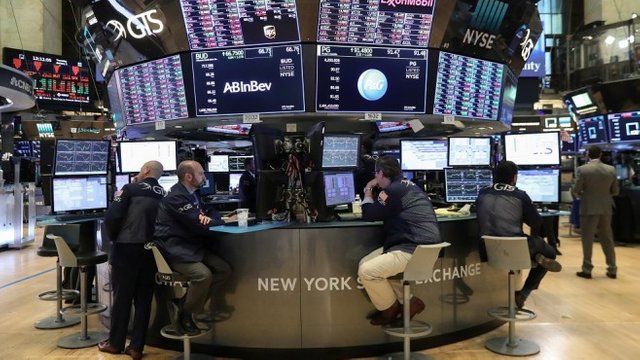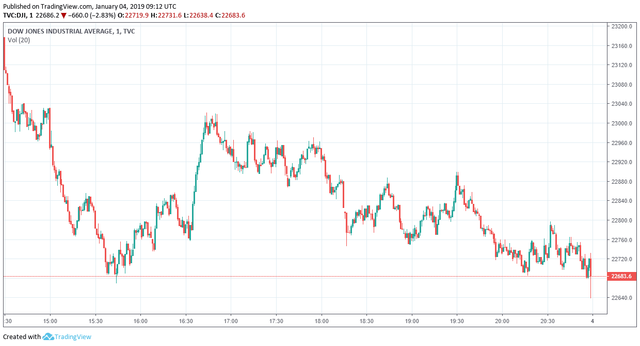
The lower sales forecasts for Apple's iPhone and the highly disappointing sentiment figures in the US industry have sent the Wall Street stock markets down on Thursday. The statement of the technology giant has further exacerbated existing investors' concerns about the general economic situation.
Later was released disappointing ISM data on the manufacturing sector and the indices fell further. In addition, the US President Donald Trump is facing more difficulties because the Democrat Nancy Pelosi was elected for speaker of the House of Representatives. Democrats already have a majority in the Chamber, and all this is happening against the ongoing partial cessation of government work.
In December, the growth of the industrial activity in the US slowed sharply to a two-year low as a result of the sharp weakening of new orders and production itself, according to the Institute for Supply Management (ISM). The index of ISM, which is measuring industry activity, declined in December to 54.1 points from 59.3 points in November against the expectations for a much moderate decrease to 57.5 points.
On this background, the blue-chip index Dow Jones Industrial Average lost 661.58 points, or 2.8%, to 22,684.66 points. The broader index S&P 500 wiped out 62.18 points, or 2.5%, to 2,447.87 points, while the technology Nasdaq Composite shrank by 202.43 points, or 3%, to 6,463.50 points.
Curiously, small caps performed relatively better but still caved in price. The Russell 2000 fell 1.3%. The S&P SmallCap 600 fell 1.8%, snapping a five-day winning streak.
The analysis of data from the private employment service provider ADP, an early indicator of the government's official labor market report this Friday, has shown positive developments. The US production growth scenario is still intact. However, the ISM index surprisingly sharply declined in December with the strongest in 10 years. This, in turn, has further exacerbated concerns about the economy.
Corporate performance
The stocks of Apple were the biggest losers during the session, decreasing their price by 9.96% to the lowest level since July 2017. The business of the company on Christmas holidays has developed significantly worse than expected. As a result, the iPhone maker lowered its revenue forecast for the fourth quarter of 2018 to 84 billion USD, while in November it expected between 89 billion USD and 93 billion USD. In particular, the weaker iPhone sales in China, which are a reflection of the Sino-American trade war, were the main contributors for the decrease.
This has also affected the shares of sensor manufacturer Lumentum, which is Apple's supplier. The stocks of the company wiped out 8.4% of their value. The stocks of graphics card maker Nvidia also declined by 6.04%.
A decrease in Delta Airlines' revenue expectations led to a company's stock price depreciation by 8.93% to its lowest level since September 2017. The company's revenues are expected to grow only 3% annually in the fourth quarter of 2018, instead of 3.5%, as previously projected.
The other airlines also suffered serious damages in their stock prices. The shares of United Continental depreciated by 4.97%, while those of American Airlines dropped by 7.45%.
Shares of S&P 500 healthcare companies are a bit cheaper after Bristol-Myers Squibb announced plans to acquire the cancer drug maker Celgene for about 74 billion USD. The stocks of Bristol-Myers collapsed by almost 14%, while Celgene Corporation's shares rose by 20.69%.
Posted from my blog with SteemPress : http://financeandmarkets.com/apple-dragged-wall-street-down/

Not only Apple but also different industry maybe because of the China and and US relation but for sure it will be up again knowing Apple they will do their best.
Downvoting a post can decrease pending rewards and make it less visible. Common reasons:
Submit